Gen Z vs Gen Alpha: what students expect from their university digital experience
Insights from Jisc's Digital Experience Insights Report and our own Gen Alpha report about students' digital expectations

September is a busy time for higher education in the UK, so if the Jisc Student Digital Experience Insights Report has slipped off your radar, worry not! We’re unpacking their findings in this blog, and analysing what this means for you as an IT professional. We’re even taking you a step further into the future, with unique insights into Gen Alpha’s technology behaviours and expectations, from our original research report published earlier this year.
When it comes to technology use and expectations of digital experiences, there are many similarities and between the two generations, after all there are only a few years difference between the younger Gen Z and the older Gen Alpha – born between 2010 and 2024. But whereas Gen Z adopted technology later in life, especially AI and social media, Gen Alpha are truly digital native: 2010 is the year of the iPad and Instagram, and AI has been a part of their learning from early age, much before their brains were fully developed.
As the first wave of Gen Alphas are getting ready to enter higher education in 2028, we wanted to find out 3 key things:
1. Is Gen Alpha different and if so, how?
2. What is their current use of technology?
3. What do they expect from higher education?
We worked with the Insights Family to survey over 400 12 to 16 year olds across the UK, and analysed data from their portal, containing responses from over 1500 students. Our findings, presented in the report “Generation Alpha – coming to a university near you” were very much in line with the Student Digital Experience Insights Report that Jisc runs every year in higher education, albeit much smaller in size.
Here how the findings compare:
.webp)
Gen Z
According to Jisc’s Digital Experience Insights 2025 report, 91% of students use laptops and 72% use smartphones to study, yet 37% reported lacking a suitable device at some point in their studies. For many, connectivity issues (60%) and cost pressures make it difficult to keep up with digital course demands.
Gen Alpha
Our report found that 84% of 12–16-year-olds own a smartphone, but only 46% own a laptop and 51% own a tablet, often shared with family members. Alarmingly, 26% have no access to a laptop or tablet at all. It’s no surprise that 92% are expecting the university to provide devices to own, borrow or use on campus.
Recommendation for universities
Digital access is now a defining factor in student equity. It is important to prioritise device-agnostic software access and loan programs and bring-your-own-device (BYOD) schemes.
AppsAnywhere enables institutions to deliver course software securely on any device, regardless of its age or spec. That means a student with a shared tablet at home can access the same digital resources as a classmate with a high-end laptop, directly supporting equitable access.
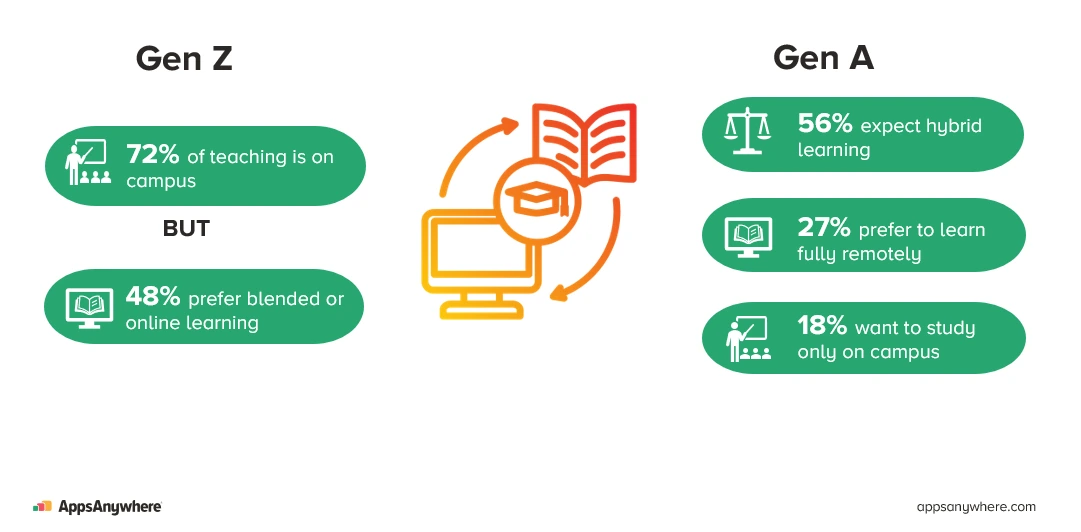
Gen Z
While 72% of teaching is delivered on campus, nearly half (48%) of students would prefer blended or online learning. Even among those who enjoy in-person learning, flexibility remains a top priority, as they combine study with work or family commitments.
Gen Alpha
For the next generation, hybrid learning is the default. The report shows that 56% of students aged 12–16 anticipate hybrid learning in higher education, with only 18% preferring full on-campus study.
Recommendation for universities
Adopt a “hybrid by default” delivery model, ensuring resources and applications are accessible from both campus and home.
With AppsAnywhere, universities can make the transition seamless. By virtualising and streaming software, institutions give students the same access experience wherever they learn — a critical enabler for both Gen Z’s flexibility and Gen Alpha’s hybrid-first mindset.
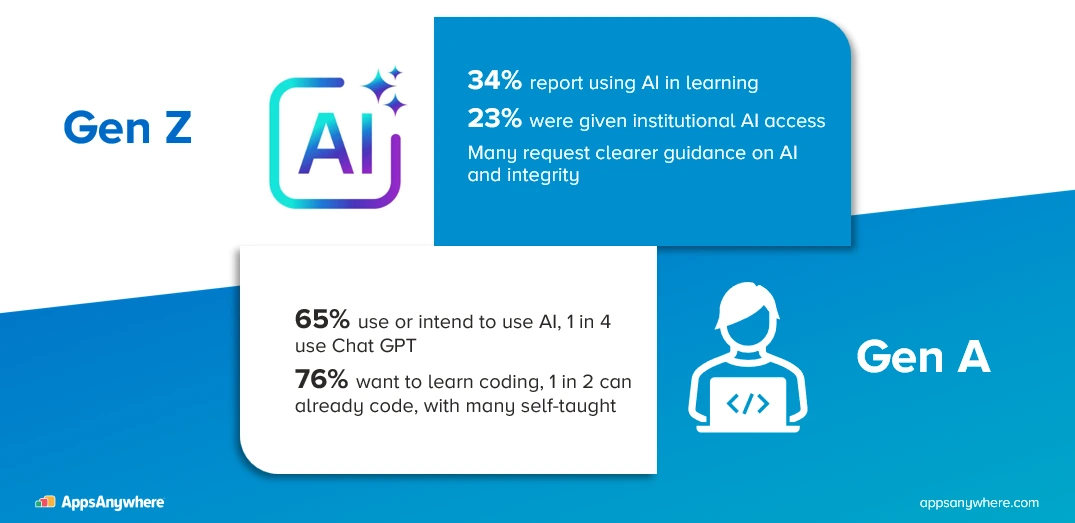
Gen Z
Use of AI among current students has risen sharply — 34% are already using AI tools, and 23% have been provided access by their university. However, Jisc found many students are uncertain about academic integrity and lack confidence in AI ethics and best practices.
Gen Alpha
This next generation will arrive as AI-natives. Around 65% are using or plan to use AI soon, and 76% say they can or want to learn coding, with many self-taught through YouTube and online platforms.
Recommendation for universities
Embed AI literacy and digital skills training into curricula early, regardless of the course subject. These are skills everyone should have. Create environments that allow safe, supported experimentation with AI and coding.
AppsAnywhere can help by giving students controlled access to AI and development tools without installation barriers – a secure sandbox for creativity. Universities can build AI competency and digital confidence while maintaining oversight and compliance.
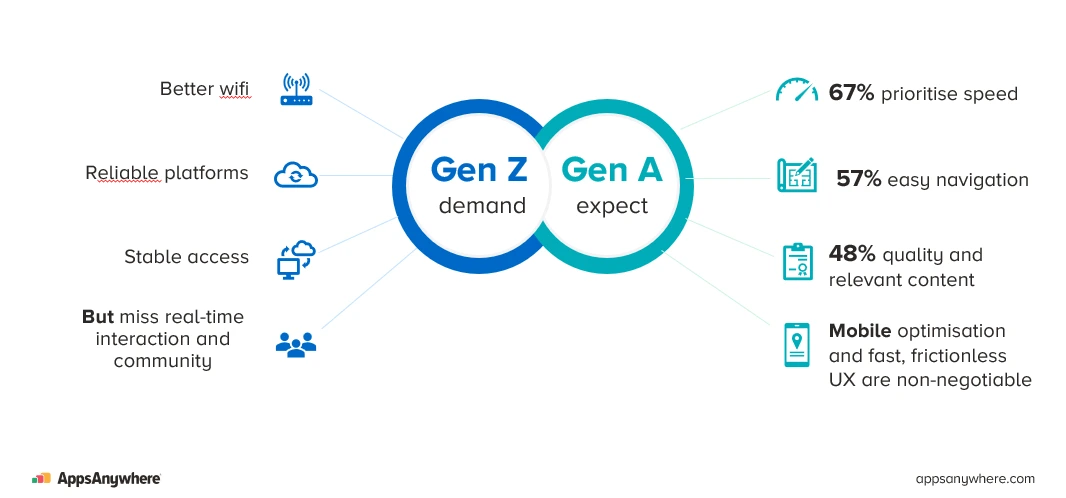
Gen Z
Students today expect reliability over novelty or pretty design: strong wifi, single sign-on, and systems that “just work.” According to Jisc, wifi issues affected 60% of learners, and fragmented systems remain a top frustration.
Gen Alpha
For the next generation, experience is everything. 67% prioritise speed, 57% ease of navigation, and 48% quality of content. Gen Alpha’s tolerance for lag, broken links, or multi-login systems is practically zero.
Recommendation for universities
Focus on frictionless, mobile-first digital infrastructure. Simplify access and centralise resources under a consistent user experience.
AppsAnywhere helps achieve that by streamlining access to all software from one portal — optimised for any device. For Gen Z, it means reliability; for Gen Alpha, it’s the intuitive UX they already expect.
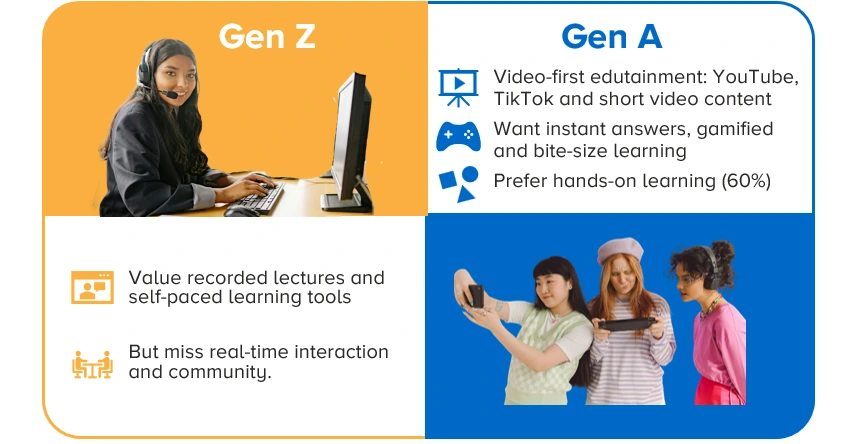
Gen Z
Students value flexibility and autonomy: recorded lectures, online collaboration tools, and self-paced study options. But they also crave connection – many say they miss real-time discussion and community when studying online.
Gen Alpha
Raised in the age of short-form video, this generation leans towards visual, interactive, and gamified content. They learn through TikTok, YouTube, and edutainment, expecting immediate and straightforward answers and engagement. Although most are glued to their screen, Gen Alpha prefer hand-on learning (60%).
Recommendation for universities
Blend traditional learning with multimedia, interactive, and bite-sized content. Support students in both consuming and creating educational media.
With AppsAnywhere, universities can make creative and media-production tools accessible to everyone, from video editing to design apps, empowering students to learn and express in formats that resonate with their generation.
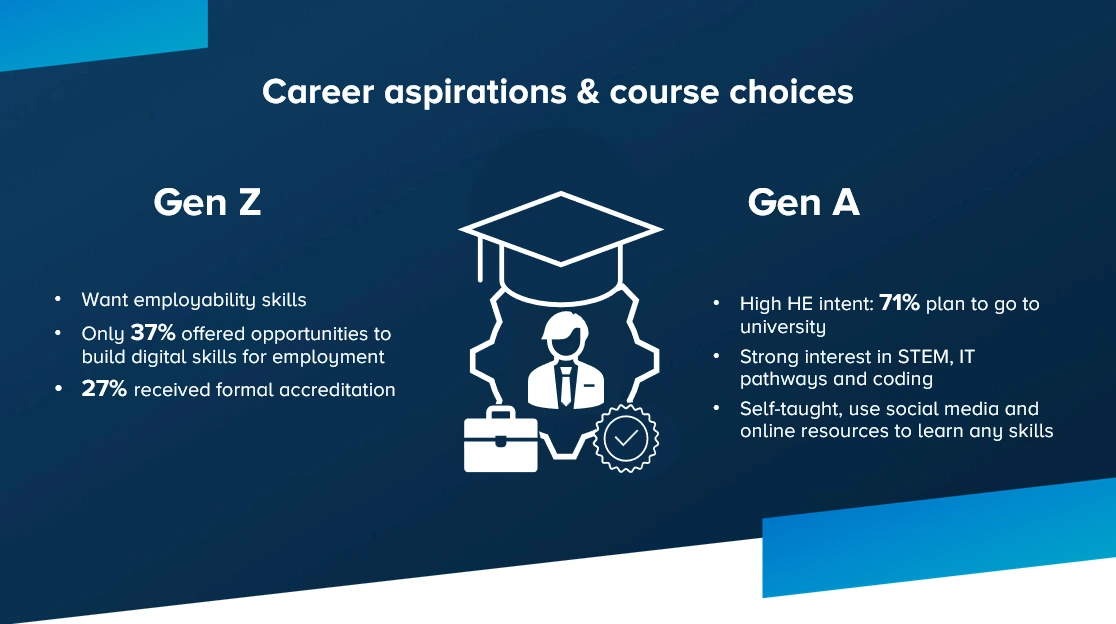
Gen Z
Despite their tech familiarity, only 37% of students say their institution offers digital skills for employability, and just 27% receive accreditation for them. Many graduates still feel underprepared for digital workplaces.
Gen Alpha
Ambition levels are high: 71% plan to go to university, and interest in STEM and IT careers is particularly strong. As they grow up being told their jobs will be taken by AI, Gen Alphas will seek programs that clearly link to future job prospects.
Recommendation for universities
Build employability through access to industry-standard tools, digital credentials, and hands-on project work.
AppsAnywhere supports this by providing campus-wide access to professional software used across industries, helping students develop career-ready skills and digital fluency before graduation.
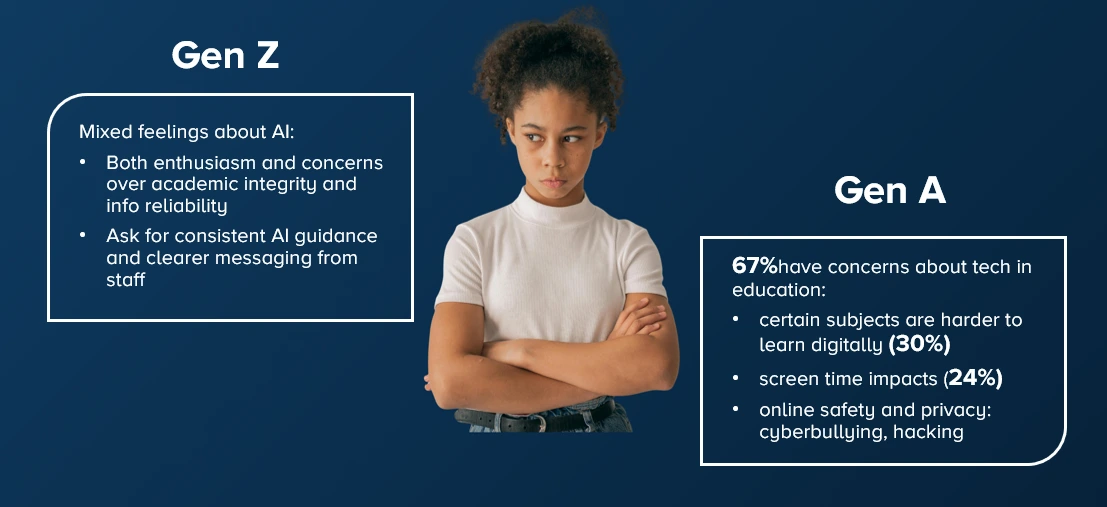
Gen Z
While many are embracing AI, concerns about integrity and accuracy are very common. Students want clearer policies and guidance from staff on ethical AI use and data privacy.
Gen Alpha
This generation’s digital anxieties are different, as the use of technology is more widespread. 67% recognised they have concerns about the use of technology in education, 24% worry about screen time affecting their focus and wellbeing, 30% about certain subjects being harder to learn digitally, and many cite online safety, privacy, and cyberbullying as key concerns.
Recommendation for universities
Promote digital wellbeing, safety, and responsible AI use. Create a safe, structured framework for technology in learning, be transparent in how and where their data is being used and educate them around cyber safety. Mental health programs and check-ins are key in dealing with any issues that may go under the radar as students prefer to learn remotely.
AppsAnywhere helps by centralising access in a secure environment, ensuring students use approved, licensed applications within university policies, balancing innovation with digital safety and wellbeing.
Both generations are reshaping what “digital learning” means. Gen Z is still adapting, seeking balance, flexibility, and fairness, while Gen Alpha will arrive expecting it all to already work.
For universities, that means preparing now: investing in accessible digital ecosystems, simplifying the user experience, and embedding technology that scales with change.
To see how AppsAnywhere can support your institution in meeting these needs, book a demo.

Sign up to our newsletter.
AppsAnywhere is a global education technology solution provider that challenges the notion that application access, delivery, and management must be complex and costly. AppsAnywhere is the only platform to reduce the technical barriers associated with hybrid teaching and learning, BYOD, and complex software applications, and deliver a seamless digital end-user experience for students and staff. Used by over 3 million students across 300+ institutions in 22 countries, AppsAnywhere is uniquely designed for education and continues to innovate in partnership with the education community and the evolving needs and expectations of students and faculty.


Register your interest for a demo and see how AppsAnywhere can help your institution. Receive a free consultation of your existing education software strategy and technologies, an overview of AppsAnywhere's main features and how they benefit students, faculty and IT, and get insight into the AppsAnywhere journey and post launch partnership support.

Register your interest for a demo and see how AppsAnywhere can help your institution. Receive a free consultation of your existing education software strategy and technologies, an overview of AppsAnywhere's main features and how they benefit students, faculty and IT, and get insight into the AppsAnywhere journey and post launch partnership support.